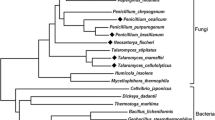Abstract.
Exopolygalacturonase (exo-PGase, EC 3.2.1.67) attacks the non-reducing terminus of the polygalacturonic acid in pectic molecules, releasing galacturonic acid. We cloned the cDNA of exo-PGase purified from cell homogenates of suspension-cultured carrot (Daucus carota L. cv. Kintoki) cells. The nucleotide sequence of the cDNA (1.4 kb) contains an open reading frame that encodes a 391-amino-acid polypeptide. Sequence homology research showed 97.9% identity to the glycoprotein EP4 obtained from cultured carrot cells and 49.3% identity to the ENOD8 gene product of alfalfa (Medicago sativa). However, no significant similarity was found to known PGases. The Southern hybridization pattern indicated that this exo-PGase protein is a member of a small-sized gene family. Predominant expression of the exo-PGase gene was detected by in situ hybridization and immunohistochemistry in the root apical meristem and in the elongation region, but not in the root cap. A cross-immunoresponse with anti-exo-PGase also occurred in the root nodule meristem of alfalfa. These results suggest that this exo-PGase plays a role in the degradation of pectic molecules during root development.
Similar content being viewed by others
Author information
Authors and Affiliations
Additional information
Electronic Publication
Rights and permissions
About this article
Cite this article
Tanaka, R., Ikeda, M., Funatsuki, K. et al. Molecular cloning and cytochemical analysis of exopolygalacturonase from carrot. Planta 215, 735–744 (2002). https://doi.org/10.1007/s00425-002-0807-4
Received:
Accepted:
Issue Date:
DOI: https://doi.org/10.1007/s00425-002-0807-4




